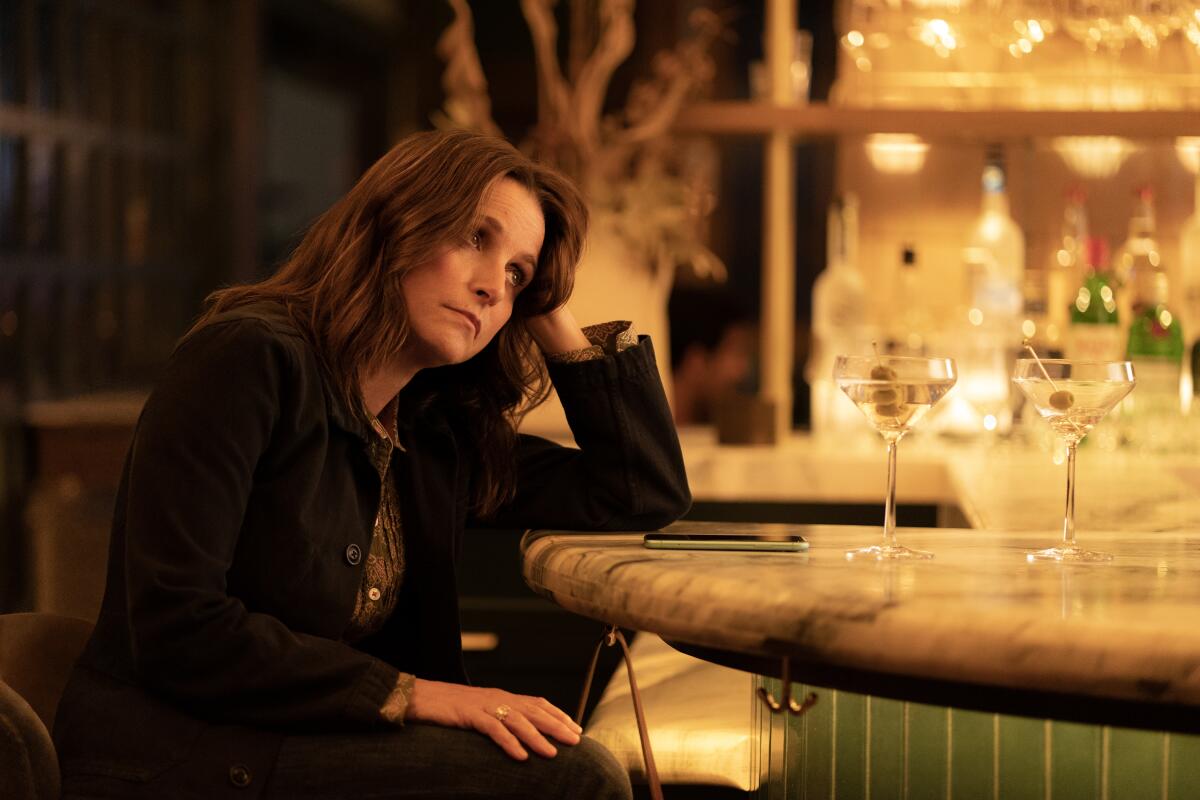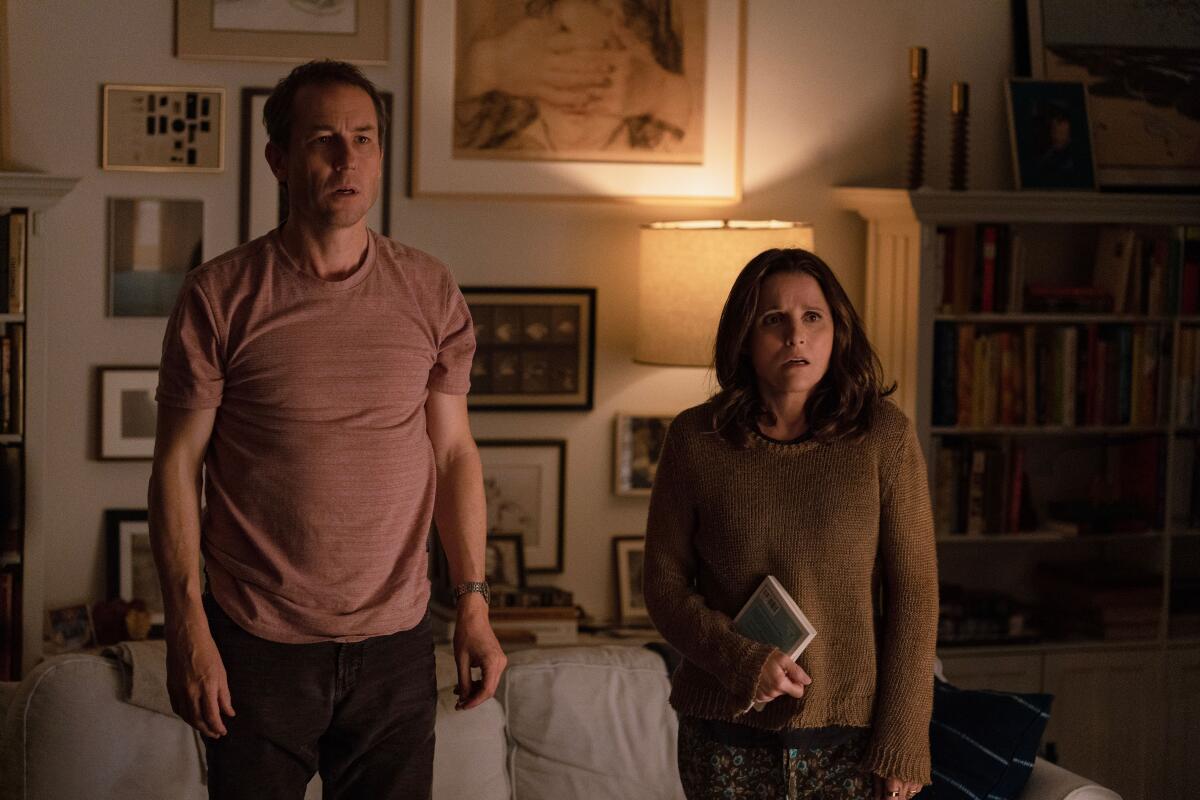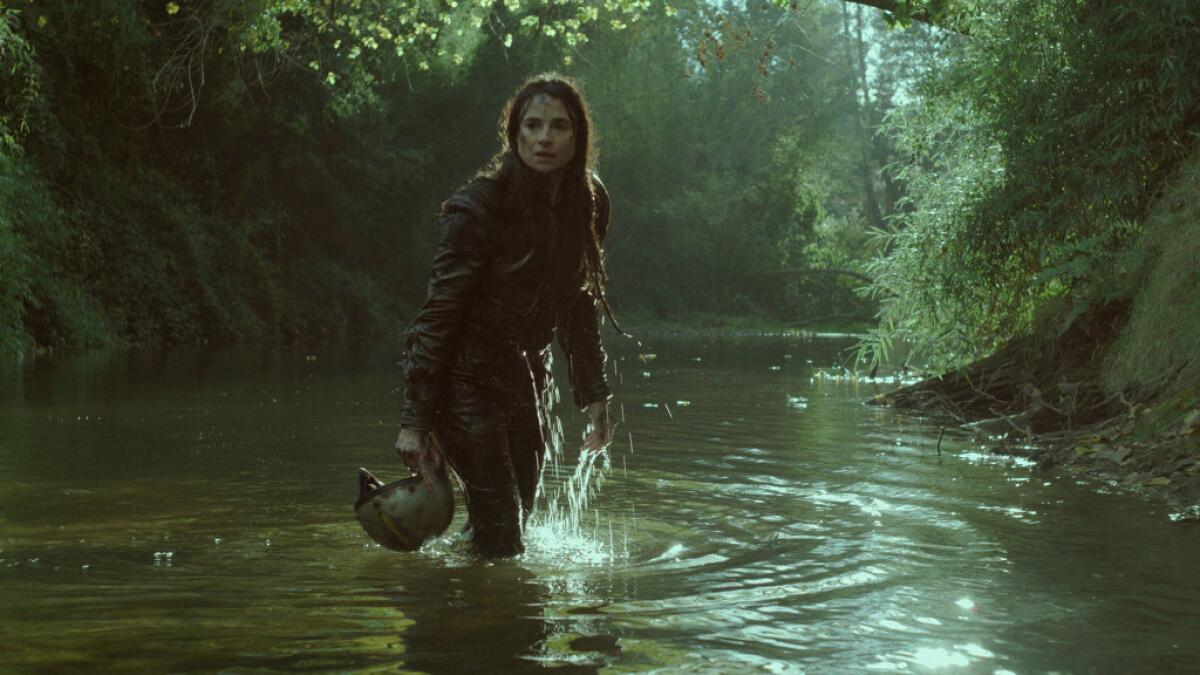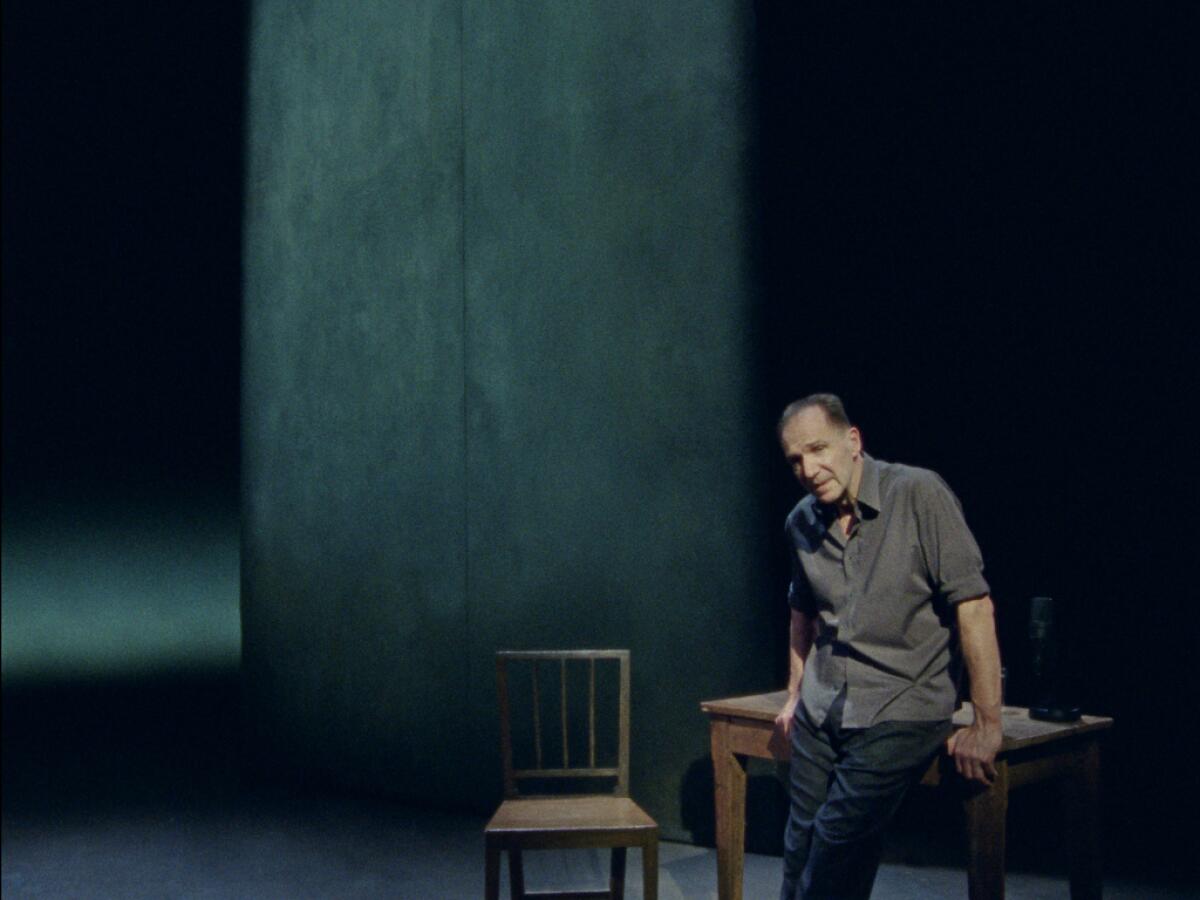Julia Louis-Dreyfus explores everyday issues in ‘You Hurt My Feelings’

- Share via
Hello! I’m Mark Olsen. Welcome to another edition of your regular field guide to a world of Only Good Movies.
A single day this week saw the deaths of singer Tina Turner, filmmaker Kenneth Anger and musician Bill Lee. All will leave lasting legacies.
LALIFF. The Los Angeles Latino International Film Festival kicks off Wednesday with the opening night selection of Eva Longoria’s “Flamin’ Hot.” The festival runs through June 4 and will close with Julio Torres’ “Problemista.” The festival also features previews of the Prime Video series “With Love” and Freevee’s “Primo,” a screening of “Spider Man: Across the Spider-Verse” and a selection of films including Lorena Padilla’s “Martínez,” Tomás Gómez Bustillo’s “Chronicles of a Wandering Saint,” Yolanda Cruz’s “Hope, Soledad” and Carolina Markowicz’s “Charcoal.”
Cannes wraps up. The Cannes Film Festival isn’t quite finished yet, with the awards ceremony this weekend, but Justin Chang and Mary McNamara have had it pretty well covered, from “Indiana Jones and the Dial of Destiny” to “The Idol” and “Killers of the Flower Moon.” Other titles of note that will eventually make their way to stateside audiences include “The Zone of Interest” and “Occupied City.” Justin and Mary also gave their final thoughts on the fest.
Enjoying this newsletter? Consider subscribing to the Los Angeles Times
Your support helps us deliver the news that matters most. Become a subscriber.
‘You Hurt My Feelings’
Written and directed by Nicole Holofcener, “You Hurt My Feelings” is another of the filmmaker’s warm, funny and insightful explorations of middle-class and (for now) middle-aged life. Beth (Julia Louis-Drefyus) is a writer who is devastated to discover that her husband, Don (Tobias Menzies), actually does not like her new book. With a cast that also includes Michaela Watkins, Arian Moayed, Owen Teague and Jeannie Berlin, the film examines life’s little disappointments and the consolations that make it possible to get through each day. The film is in theaters.
For The Times, Glenn Whipp wrote, “Yes, ‘You Hurt My Feelings’ explores the incident of its title and the risks and limits of total honesty in a relationship. But it’s also a funny and incisive look at middle-age malaise, a time when potential has been replaced by plateaus and one might take an inordinate amount of pleasure in the comfort that comes from a well-made pair of socks. … By the film’s end, some lessons will have been learned, though Holofcener proffers them with such disarming skill that you may not be aware you absorbed them. It feels like a magic trick.”
For the New York Times, Wesley Morris wrote, “No American director’s more committed to exposing the smugness and self-aggrandizement of bourgeois urbanites. … Part of me thought I wanted something wilder from Holofcener, comedy that felt like crisis. The way some of her earlier films do; the way it does in the novels of Nell Zink and Patricia Lockwood. But her studies of ego and frailty are closer to Albert Brooks and Larry David: about breaches of etiquette rather then psychological breaks. Still, this feels like a quiet breakthrough for her. She’s put the emotional dynamite away (her steadiest supplier of TNT, Catherine Keener, isn’t here). Instead, this is a work of discipline and structure. It’s a situation comedy in the best, classical sense: These people’s ethical problems are sometimes ours. I’ve been Beth. I’ve been Don. And I had to watch half of what they’re dealing with through my fingers.”
For the Washington Post, Ann Hornaday wrote, “These problems might sound like a hill of beans typical of the prosperous, occasionally shallow Manhattanites who populate ‘You Hurt My Feelings.’ But Holofcener never trivializes their pain, even if she examines it with a playfully jaundiced eye. … the movie gains steady velocity and unexpected depth in the way Holofcener gently guides her characters through choppy emotional waters, allowing them to get rocked around a little, but never to capsize completely. As a chronicle of the pains we all take just to get through the day, ‘You Hurt My Feelings’ rings uncannily true. As a slice of life spiked with mordant, uncynical humor, it’s deliciously entertaining. In other words, it’s another Holofcener movie, which means it’s perilously close to perfect.”
For Slate, Dana Stevens wrote, “More than the study of a single character, ‘You Hurt My Feelings’ is a chamber piece about a quartet of people contending with the same common yet painful life experience: the realization, a few decades into adulthood, that one’s future seems unlikely to be as successful, as fulfilling, as special as one had been led to hope. That sounds like a dour theme for a movie, but ‘You Hurt My Feelings’ (which whisks by at 93 minutes) makes it both a serious subject of contemplation and a source of effervescent comedy. … Holofcener is a writer-director in the truest sense, a filmmaker whose movies stand out for the attention they pay to the nuances of everyday speech and behavior. Her scripts have a way of finding humor in whole situations and contexts rather than in quotable one-liners. Scenes often end a beat sooner than they might in a conventional comedy, leaving the viewer to fill in the blanks. Though the dialogue is naturalistic, it never sounds improvised at random.”

‘The Cow Who Sang A Song Into The Future’
The debut feature for Chilean filmmaker Francisca Alegría, “The Cow Who Sang a Song Into the Future” first premiered at the 2022 Sundance Film Festival. Mía Maestro stars as Magdalena, who though long-dead emerges from a river to be reunited with generations of her understandably surprised family. Though Magdalena doesn’t speak, she seems able to communicate with the natural world in extraordinary ways. The film is in theaters now.
For The Times, Carlos Aguilar wrote, “With finely tuned magical realist sensibilities, first-time writer-director Francisca Alegría launches into a hauntingly atmospheric tale that denounces humanity’s untenable relationship with the natural world. Those abiding by an arrogant and exploitative understanding of our place on Earth, the film suggests, fail to listen to the creatures with whom we share this planet. In dismissing their concerns, they threaten their own existence. … But rather than delivering a pessimistic end-of-times eulogy, ‘The Cow Who Sang a Song Into the Future’ shows a sanguine trust in younger generations, who might fight for the river, for all abused sentient beings, and for the freedom to be their true selves.”
For the New York Times, Brandon Yu wrote, “The power of Alegría’s feature debut is found not in dialogue or explication, but in the lyrical, magical realist qualities of folklore: disappointed mothers and fathers, sacred animals and cursed rivers, love and forgiveness. … While often elliptical, Alegría’s directing is patient, a good quality for a movie that could have fallen prey to sanctimony. In this film, the purest truth can be seen in the eyes of its cows — the mournful gaze of the mothers, and the tragically innocent look of the calves that have been torn from them.”
For Variety, Manuel Betancourt wrote, “Rather than let its timely concerns be embalmed in didacticism, Alegría has crafted a film about healing generational trauma through new modes of living and experiencing desire — of reshaping the world in a way that feels inclusive and expansive, and which does away with relics of a past that should be left to rot at the bottom of a river. An idiosyncratic proposition from the start, Alegría’s debut is a wonder precisely because, even as it borrows bits of genre pieces from here and there, the film firmly cements its director as a distinctive voice in Chilean cinema. … Alegría has created a modern-day fable that aims to remind us to live fully and to be in and of this world with such force you cannot help but be bowled over by its keen-eyed ambition.”

‘T.S. Eliot’s Four Quartets’
Directed by Sophie Fiennes, “Four Quartets” is an adaptation of her brother Ralph Fiennes’ stage production that finds him reciting T.S. Eliot’s epic poem alone onstage. For those who couldn’t see the performance in-person, this is a unique opportunity for fans of the poet and the actor alike. The film is in theaters now.
For The Times, Robert Abele wrote, “Unabashedly theatrical in presentation but broken up with interludes of nature, this ‘Four Quartets’ is a multi-course feast of concentrated flavors: mesmerizing language, masterly invocation, and the kind of poetic imagery that in the hands of a great actor feels like a direct line from Eliot’s pen to our mind’s landscape. … ‘Four Quartets’ is the definition of specialized fare for a niche audience, but in its purity of connection gets one to wonder why there aren’t more opportunities to see intimately staged theater performances preserved on film. Though this modest format can sometimes smack of educational PBS evenings and visual stiltedness, it’s ripe for reappraisal and reimagining for its unobtrusively performance-driven humanity, as Sophie Fiennes’ starkly reverential capturing of her brother’s impressive passion project reveals.”
For the New York Times, Teo Bugbee wrote, “As an actor, Fiennes contorts, stomps and dances — he delivers an animation of Eliot’s language, a forceful performance that treats the accumulation of verse into poetry like the strenuous, mathematical raising of walls in a cathedral. He speaks slowly, granting viewers time to grasp Eliot’s words. Yet for all of the actor’s efforts, the film around him does not match his mellifluousness. … Fiennes brings the fire, yet the air around him remains unmoved, even by his embers.”

Only good movies
Get the Indie Focus newsletter, Mark Olsen's weekly guide to the world of cinema.
You may occasionally receive promotional content from the Los Angeles Times.




